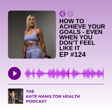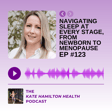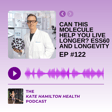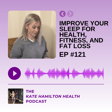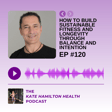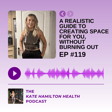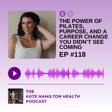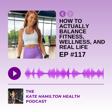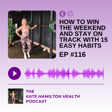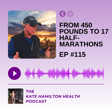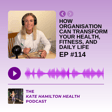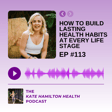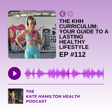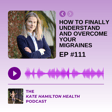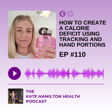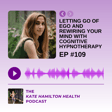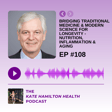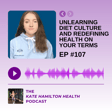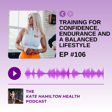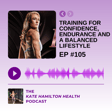
#104: MJ Nutrition: Everything you need to know about treating PCOS naturally
Struggling with PCOS and unsure where to start?
In this episode of The Kate Hamilton Health Podcast, I sit down with Mary Jo of MJ Nutrition, a registered nutritionist specialising in women’s health and PCOS. We break down common misconceptions, discuss the critical role of gut health in hormone regulation, and explore practical nutrition and lifestyle strategies to help you take control of your symptoms.
Mary Jo also shares her personal journey with PCOS and how she now helps women navigate their own health challenges. We debunk myths - like whether you really need to cut carbs or if the pill "cures" PCOS - and provide science-backed strategies to support your body naturally. Plus, we dive into fertility, hormone balance, and the best dietary choices for managing PCOS effectively.
If you're looking for real, actionable advice, this episode is a must-listen.
Episode Highlights
[00:00] – Welcome to The Kate Hamilton Health Podcast
[00:13] – Meet Mary Jo: Nutritionist & PCOS Specialist
[02:12] – Mary Jo’s Personal PCOS Journey & Insights
[04:16] – Understanding PCOS: Symptoms, Causes & Diagnosis
[09:48] – PCOS Myths Busted: Carbs, Birth Control & More
[12:59] – Navigating PCOS Treatment Options
[20:10] – Diet & Lifestyle Hacks for Managing PCOS Naturally
[26:52] – Protein Sources Beyond Powders & Choosing the Right One
[29:20] – How Much Protein Do Women Actually Need?
[32:11] – Gut Health & PCOS: The Overlooked Connection
[36:56] – The Power of Probiotics for Gut & Hormone Balance
[44:35] – PCOS & Fertility: Separating Fact from Fiction
[49:56] – Final Thoughts & Where to Find Mary Jo
Links & Resources:
- Connect with Mary Jo on Instagram here
If you enjoyed this episode, please subscribe, leave a review, and share it with friends who might benefit. For more health and fitness tips, follow me on Instagram and TikTok @katehamiltonhealth.
Music b LiQWYD Free download: hypeddit.com/link/xxtopb [http://hypeddit.com/link/xxtopb] Promoted by FreeMusicPromo [https://www.youtube.com/channel/UCbycji-eySnM3WD8mbxPUSQ] / @freemusicpromo
Disclaimer
This podcast is for informational purposes only and is not intended as medical advice. Always consult with a qualified healthcare professional before making changes to your diet, lifestyle, or treatment plan.
